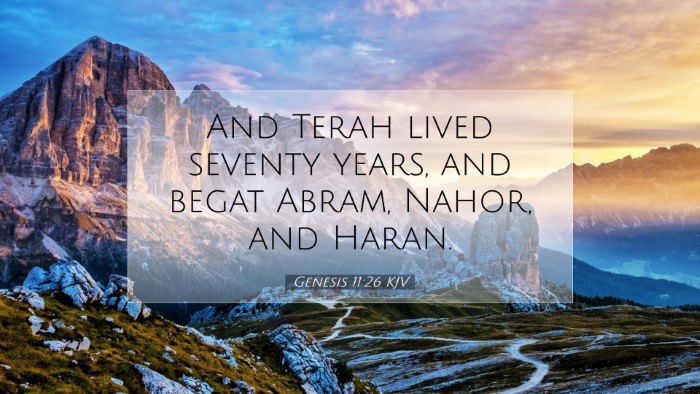Commentary on Genesis 11:26
Genesis 11:26 states:
"And Terah lived seventy years, and begat Abram, Nahor, and Haran."
Overview
This verse marks an important genealogy leading to Abraham, a pivotal figure in biblical history. The mention of Terah and his sons serves as a bridge between the early narratives of creation and the unfolding story of God's covenant with His chosen people.
Significance of Terah
Terah's Role: Terah, the father of Abram (later Abraham), Nahor, and Haran, holds a significant place in biblical genealogy. His age at the time of his children’s births indicates a transition in the lineage that would lead to God's covenantal promises.
- Father of Abraham: Terah’s lineage is crucial as it leads directly to the patriarchal narrative.
- Terah in Context: The genealogical account serves to establish the familial roots of Abraham, emphasizing the historical context of God's plan for salvation.
Insights from Public Domain Commentaries
Matthew Henry's Commentary
Matthew Henry highlights the significance of Terah's age and the names of his sons. He emphasizes that the naming of Abram (Abraham) is profoundly meaningful as it points to the future covenant God will establish. Henry notes that the genealogy is not merely a listing of names but a powerful testimony of God's providence and purpose.
Henry reflects on the idea that Terah, being the father of Abram, foreshadows the importance of parenthood in the biblical narrative. He suggests that even in Terah's eventual failures (such as his idolatry), God’s plan continues steadfastly through Abram's life.
Albert Barnes' Notes
Albert Barnes places emphasis on the context of Terah's life, noting the geographical and cultural implications of Terah living in Ur of the Chaldeans. Barnes mentions that this location is significant as it represents a center of idolatry and sin, setting the stage for Abram's eventual calling out of this environment.
- Cultural Context: The mention of Ur provides insight into the spiritual challenges Abram faced and illustrates the divine call to leave a life of immorality.
- Theological Implications: Barnes considers the age of Terah, suggesting that God can raise up leaders from a family entrenched in idolatry, showcasing the grace and sovereignty of God.
Adam Clarke's Commentary
Adam Clarke expands on the genealogical listing, discussing the implications of each name mentioned. Clarke draws attention to the names themselves, suggesting that they carry meanings reflective of the roles they would play in the unfolding narrative of redemption.
In his analysis, Clarke posits that Terah's legacy is a mixture of both positive and negative attributes, illustrating that despite his failures, God's choice of Abram shows an integral theme in Scripture—God’s ability to work through flawed humanity.
The Theological Themes
- Divine Sovereignty: Terah’s family is chosen by God to fulfill a divine purpose, emphasizing God's control over human history.
- Preparation for Covenant: This verse transitions into the greater narrative of God’s covenant with Abraham, illustrating how God orchestrates events long before they unfold.
- Legacy and Influence: Terah’s impact on Abraham serves as a reminder of how familial patterns can influence faith journeys, showcasing both challenges and the possibility of redemption.
Application for Pastors and Theologians
This verse challenges church leaders and scholars to reflect on the inheritances of faith they pass on to future generations. It emphasizes the importance of strong spiritual legacies and the transformative power of God through ordinary families.
- Faith in Dysfunction: Leaders are reminded that God often works through imperfect situations and individuals.
- Generational Faithfulness: The call to faith is often intergenerational; pastors must encourage families to nurture faith in their children as seen in the lineage from Terah to Abram.
Conclusion
Genesis 11:26 may appear simple at first glance, yet it encapsulates profound theological truths about God's sovereignty, grace, and the unfolding of salvation history. The commentaries of Matthew Henry, Albert Barnes, and Adam Clarke weave together a rich tapestry of insights that affirm the significance of Terah in the biblical narrative and God's extraordinary ability to work through commonplace beginnings to achieve divine ends.


